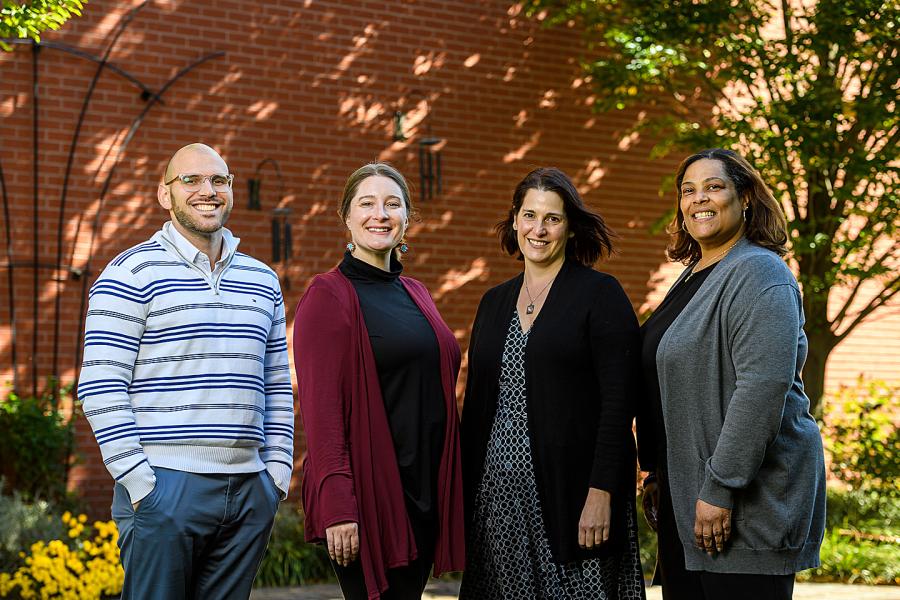Even as a child, Kimberly Claiborne felt moved to offer comfort, helping other youngsters when they were upset by talking them through their troubles. "It's always been a calling," she says. "I tell people it's my ministry. I've always been drawn to try to help individuals resolve their problems. It's a real gift to be able to help someone change the quality of his or her life."
It's a calling that continues to this day, through her work as a practicing therapist and clinical supervisor of Johns Hopkins University's Onsite Clinical Care Team, mental health clinicians who also include Rachel Liccardo, Anthony Meek, and Alyssa Toran. All—including Claiborne—deliver short-term one-on-one care as part of the newly enhanced Johns Hopkins Employee Assistance Program, or JHEAP (formerly mySupport). Like many employers today, JHU recognizes that supporting the mental health of its employees ensures a happier, healthier, and more productive workforce.
The team's goal is to assist employees who may be struggling with work or family pressures, or other stressful issues. The program offers six free sessions—no insurance required—and provides referrals for ongoing long-term services for those who need additional counseling once the short-term sessions are over. The meetings are available in person, on the East Baltimore, Homewood, and Eastern campuses; or virtually, by televisit or phone.
"Everybody has 'stuff' they are dealing with," Toran says. "I don't think anybody goes through life completely unscathed. We are complex. We have layers. Regardless of whether things are hard or going well, it's always important to have somebody to talk to."
Liccardo agrees, pointing to pressures that surface during the workday as a major focus for attention, whether they result from the job or from outside the workplace. "We spend so much of our time at work, why not try to make that time fulfilling and gratifying?" she says. "In addition to the tasks required—which in and of themselves can be stressful—work revolves around relationships and other interactions. We are here to support these connections and make them easier to navigate."
It's critical that therapists understand that clients may feel uneasy as therapy begins, especially if it is their first such experience, Claiborne says.
"Someone who has never been to therapy before doesn't know what to expect," she says. "They are being asked to share some of the most intimate details of their lives with a stranger, so it's important to build a relationship and create an environment where they feel comfortable."
The process "is not about the clinician, it's about the client," Claiborne adds. "I am only a part of change in a person's life—the person is the real driver of his or her change."
Meek believes it's important "that people know we are here for them," he says. "Being able to remove barriers to getting connected—to be able to provide timely support without having people go through insurance and jumping through hoops—that's what makes us so useful."
Toran agrees. "We want to make sure everyone knows we want people to come and see us, and that this can be a welcoming and painless experience," she says. "We don't want people to be intimidated. There's nothing that's taboo. There's nothing they can tell us that will throw us for a loop."
Moreover, the positive interaction moves in both directions, Meek says. "Seeing real change fills my cup and continues to affirm I am in the right place doing the right work," he says. "The experience of being able to walk with someone through the low points in their lives and see a breakthrough is a cool thing. I am really in the right place and passionate about it."
All four share the same dedication but came to the field in different ways.
Liccardo spent 15 years in public relations and market research before deciding to switch careers at midlife. "It was scary, but it needed to be done, and I'm glad I did it," she says. She realized how much she enjoyed human interaction when she ran focus groups and conducted interviews as part of her previous job. "I loved talking to people," she says.
As a result, she looked back at her earlier goals and thought they were worth revisiting. She majored in psychology at Duke, where she volunteered in the student counseling center and organized campus stress management workshops. And before veering into the PR/marketing world, she had considered becoming a psychologist. So, she went back to school and earned a master's degree from the University of Maryland School of Social Work. She began her career at Hopkins working at the Johns Hopkins Hospital Broadway Center for Addiction.
She believes everyone has the potential for growth through therapy. "Most people have the capacity to work things out," she says. "People know themselves better than anyone else. I fully subscribe to the perspective of meeting clients where they are. I let them start wherever they want to start. They may start with one issue, but there probably are multiple issues. My role is to listen carefully, ask questions, guide them—and help them find their way."
Meek began thinking about becoming a therapist when he was in high school—"being there for my friends," he says—and majored in psychology at the University of Maryland, College Park, before receiving a master's degree from the University of Maryland School of Social Work.
He grew up in Baltimore County and enjoys working with the Hopkins population. "You really get it all," he says. "Workplace stress, relationships with co-workers, figuring out how to cope with the pandemic. Loss. Grief. Aging parents. Alcohol and drug use. We can be a useful and convenient resource for people who need to talk to a mental health professional who knows and understands the Hopkins community."
Toran comes from New Cumberland, Pennsylvania, a small town in the central part of the state. A graduate of Kenyon College, she landed in Baltimore to attend graduate school, earning a master's degree from the University of Maryland School of Social Work. "I've always been curious about people and the human experience, the complexities of being human," she says, explaining how she became interested in the field.
"Additionally, as a swimmer in a highly competitive college program, I became very aware of how stress and anxiety can affect performance," she adds. "I sought help from a psychologist to help me learn to balance all of my competing demands and address some anxiety issues that I was struggling with, and I realized that I wanted to help others in the same way that people helped me."
She first thought of moving to Boston after graduation—"both of my parents are from Massachusetts, and it's where my grandparents grew up, so part of me wanted to connect with my roots"—but changed her mind. "I got some really wonderful job opportunities here, so I stayed," she says.
She's happy she did. "I feel really lucky because 99% of the time I walk out of work feeling like I've helped someone and contributed in a positive way," she says. "Most days, I feel like I'm making a tangible difference in people's lives."
Claiborne has two roles: She supervises the clinicians and also works with clients. "It provides me that direct one-on-one interaction with an individual," she says, adding, "I also enjoy helping newer clinicians develop their skills, as it can be very overwhelming. When you first get into the field, you are eager to utilize every skill you learned in school. You learn very quickly that while everything from the book can be of help, it's the hands-on experience that makes a difference."
Moreover, she says, the fact that she is Black "allows me to introduce therapy to individuals who look like me, who may have never reached out to a therapist before. Historically, people of color didn't go to therapy. My hope is that clients can feel they can relate to me in order to change the narrative."
She thinks it's also important for clients to realize that therapists are not immune to the same emotional turmoil that clients themselves undergo. "At the start of the pandemic, one of our colleagues, who was also a dear friend, passed unexpectedly," she says. "This was a huge loss to our team. Because of the pandemic, we couldn't gather and comfort one another. We were going through the same stages of grief that we were simultaneously helping our clients through."
Prior to her current position, Claiborne—born, raised, and still living in Baltimore—spent 13 years as a clinical supervisor at Johns Hopkins Bayview Medical Center. In addition to her Johns Hopkins position, she has a part-time private practice and volunteers with the Pro Bono Counseling Project of Maryland, "a wonderful organization" that provides mental health services to those without insurance or with high insurance co-pays or deductibles who can't otherwise afford therapy. "It's an opportunity for me to give back," she says.
She graduated from Frostburg State University, where she majored in psychology, and earned a master's degree in education/rehabilitation counseling from Coppin State University. This specialty seeks to strengthen the counseling skills of those working in vocational and rehabilitation agencies. She's been a licensed clinician since 2009.
She and the other clinicians believe that therapists also can gain from therapy, she says. "I encourage it," Claiborne says, explaining that it helped her cope with the loss of both her mother and grandmother in recent years. "I've gone to therapy over the years for different things," she says. "Mom passed at the start of the pandemic, and I couldn't visit because of COVID. That was difficult."
Toran agrees. "I think it's important for every therapist to know what it feels like to be on the other side of the chair," she says. "I know it's helped me to feel like a much happier human, and I believe it has made me a better therapist."
Like everyone else, therapists also need to "de-stress." Claiborne loves bowling, golf, and playing pool and believes "in the importance of laughter and the spirit of gratitude for the work I do."
Meek practices yoga and meditation, does crossword puzzles, and enjoys a good game of kickball or volleyball with friends. He finds meditation especially valuable for relieving tension. "Meditation is really useful, not just for calming your thoughts but calming your body," he says. "It enables you to be present with yourself and focus on the here and now."
Liccardo works in her garden, takes nature walks, and—in a pastime she really embraced during the pandemic—churns homemade ice cream featuring unusual flavors she creates, in part as a product of her outdoor excursions. "I make the ice cream with flavors you can't find anywhere, like honeysuckle—from a trail nearby—and fig leaf, and Earl Grey tea," she says.
Toran, who swam competitively from age 4 through college, occasionally works out in the pool, runs, and lifts weights. She also enjoys trying out new Baltimore restaurants, hiking, camping with friends, and sailing with her parents. "Exercise does wonders for my mental health," she says, pausing. "Also," she adds, "I love a good nap."
Posted in Benefits+Perks, Health+Well-Being
Tagged hr newswire, who does that?









